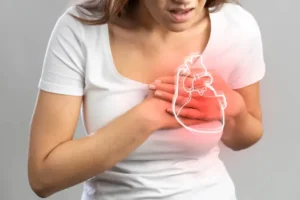Energy drinks are everywhere these days, from gym bags to office desks, giving people that much-needed boost to power through their day. But have you ever stopped to wonder if all that caffeine and sugar could be affecting your heart health?
While these drinks might give you a temporary energy kick, they can also come with some serious risks, especially when consumed regularly. In this blog, we’ll take a closer look at how energy drinks can impact your heart, the potential long-term problems, and whether they’re really worth the risk.
If you’re reaching for an energy drink to get through the day, it might be time to rethink it. Let’s dive into how they could be putting unnecessary strain on your heart!
Contents
How Do Energy Drinks Work?
 Energy drinks are designed to give you a quick boost of energy and alertness, but how do they actually work? Let’s break it down.
Energy drinks are designed to give you a quick boost of energy and alertness, but how do they actually work? Let’s break it down.
Key Ingredients and How They Affect the Body
-
Caffeine: The main active ingredient in most energy drinks, caffeine works as a stimulant, blocking adenosine receptors in the brain, which helps reduce fatigue and increases alertness. It can give you a temporary high, making you feel more awake and focused.
-
High Amounts of Sugar: This provides an instant surge of energy, but it can also lead to blood sugar spikes followed by crashes, making you feel even more tired later on.
-
Taurine: This amino acid is often included in energy drinks for its potential to improve physical performance, though its exact effects are still being researched.
-
B-Vitamins: These vitamins are included to support energy metabolism, but they don’t provide a direct energy boost on their own. They help the body convert food into usable energy.
-
Guarana and Ginseng: These ingredients are used for their natural stimulating effects, further contributing to the temporary energy boost.
Can Energy Drinks Cause Heart Problems?

According to a CDC study, about 30% of teens and young adults regularly consume energy drinks.
Additionally, athletes and fitness enthusiasts also reach for energy drinks to improve their performance and endurance, believing that they can help them push through longer and harder physical activities. In fact, about 50% of college students use energy drinks to help them stay awake for studying or exams.
But despite their popularity, it’s important to be aware of the long-term effects these drinks can have, especially on your heart health.
With that said, energy drinks can definitely cause heart problems, especially when consumed regularly or in large quantities. The combination of high levels of caffeine, sugar, and other stimulants can put a significant strain on your cardiovascular system.
If you’re concerned about how energy drink consumption may have affected your heart health, or if you’re experiencing any heart-related symptoms, MantraDoc is here to help.
Click the button below to connect with a cardiologist who can help assess your situation and provide expert guidance on how to protect your heart.
The Impact of Caffeine on Heart Health
Caffeine is the primary active ingredient in energy drinks, and while it can give you a quick boost of energy, it can also have serious effects on your heart. Here’s how:
-
Increased Heart Rate: Caffeine stimulates the central nervous system, causing your heart to beat faster. This can make you feel more alert, but for your heart, it can be a strain, especially when consumed in large amounts.
-
Elevated Blood Pressure: Caffeine causes a temporary increase in blood pressure by constricting blood vessels. This puts extra pressure on the heart and arteries, and over time, can contribute to the development of hypertension.
-
Long-Term Effects:
- Regular high caffeine intake can lead to chronic high blood pressure, which puts strain on the heart and increases the risk of heart disease.
- Arrhythmias, or abnormal heart rhythms, can be triggered by caffeine, making the heart beat irregularly. This can cause discomfort and, in some cases, more serious issues.
- Over time, excessive caffeine consumption can increase the risk of coronary artery disease, heart attack, and stroke.
While moderate caffeine consumption is usually safe for most people, consistently high intake of energy drinks can have significant long-term effects on heart health. It’s important to be mindful of how much caffeine you’re consuming to protect your cardiovascular system.
Connection Between Energy Drinks and Heart Arrhythmias
- High doses of caffeine can cause the heart to beat faster than normal, a condition known as tachycardia. This rapid heartbeat can feel like your heart is pounding or racing, and it can be uncomfortable or even dangerous for individuals with underlying heart conditions.
- Energy drinks can also trigger atrial fibrillation (AFib), a type of irregular heart rhythm where the upper chambers of the heart beat rapidly and erratically.
- This increases the risk of blood clots, stroke, and heart failure.
- AFib is particularly dangerous because it can cause long-term damage to the heart if left untreated.
So, if you’re experiencing palpitations, a racing heart, or dizziness after drinking energy drinks, it could be a sign of an arrhythmia. It’s important to monitor your heart health and consider reducing or eliminating energy drink consumption to protect your heart.
Can Energy Drinks Cause a Heart Attack?
 While a single energy drink is unlikely to cause an immediate heart attack for most healthy individuals, overconsumption or frequent use can increase the risk of cardiovascular emergencies, potentially leading to heart attacks.
While a single energy drink is unlikely to cause an immediate heart attack for most healthy individuals, overconsumption or frequent use can increase the risk of cardiovascular emergencies, potentially leading to heart attacks.
There have been cases where energy drink overconsumption has been linked to cardiovascular emergencies, including heart attacks.
For example, a study published in the Journal of the American Medical Association (JAMA) in 2011 highlighted a case report of a young, otherwise healthy individual who suffered a heart attack after drinking several energy drinks in a short period. The study concluded that the high caffeine levels in the energy drinks likely contributed to a coronary artery spasm, which restricted blood flow to the heart and caused the heart attack.
- Reference: O’Keefe JH, Bybee KA, Lanfear DE, et al. “Energy Drinks: Effect on the Heart and Cardiovascular Risk.” Journal of the American Medical Association. 2011.
Another case reported by the American Heart Association involved a teenager who collapsed after consuming several energy drinks over a short period. The individual experienced arrhythmia and was later diagnosed with electrolyte imbalances and heart failure as a result of excessive stimulant intake.
-
- Reference: American Heart Association, “Energy Drinks and Heart Disease Risks.” 2015.
These case studies are examples of how overconsumption of energy drinks can lead to severe cardiovascular problems, even in individuals who otherwise appear healthy. The high levels of caffeine and other stimulants in energy drinks can significantly affect the heart, leading to serious health complications such as heart attacks, arrhythmias, and stroke.
Healthy Alternatives to Energy Drinks
If you’re looking for an energy boost but want to avoid the negative side effects of energy drinks, there are plenty of healthier alternatives that can give you a natural pick-me-up without putting your heart at risk. Here are some great options:
- Water with Lemon
- Green Tea
- Herbal tea like ginger or peppermint
- Fresh Fruit Smoothies
- Coconut Water
- Matcha (powdered form of green tea)
- Instead of relying on drinks for energy, try eating small, balanced meals that include whole grains, lean protein, and healthy fats.
- Eat healthy snacks like nuts, seeds, or hummus with veggies.
These alternatives not only help to avoid the side effects of energy drinks, but they also offer sustained, natural energy while being better for your heart and overall health. Give them a try and feel the difference!
Conclusion: Protect Your Heart – Choose Wisely
While energy drinks might give you a quick burst of energy, the long-term consequences on your heart health can be serious. The combination of high caffeine, sugar, and stimulants puts strain on your cardiovascular system, increasing the risk of heart problems over time.
Don’t ignore the signs. If you’re concerned about the impact of energy drinks on your heart, now’s the time to make healthier choices. Switch to natural, heart-friendly alternatives and take steps to protect your health.
If you’ve been experiencing any heart-related symptoms or have concerns about how energy drinks have affected your heart, don’t wait—consult with a professional today.
FAQs
Does Caffeine Increase Cardiovascular Risk?
Yes, excessive caffeine consumption can increase the risk of cardiovascular issues, especially for people with pre-existing heart conditions. High doses of caffeine can lead to elevated blood pressure, increased heart rate, and arrhythmias (irregular heartbeats), all of which contribute to the risk of heart disease and stroke. It’s important to limit caffeine intake to avoid putting unnecessary stress on the heart.
Can Energy Drinks Lower Heart Rate?
No, energy drinks do not lower heart rate. In fact, they can raise your heart rate due to the high levels of caffeine and other stimulants. This can cause tachycardia, a condition where the heart beats faster than normal, which can be harmful to those with heart conditions. Energy drinks are meant to provide a quick energy boost, but they can also place significant stress on your cardiovascular system.
What Are the Heart Attack Symptoms Linked to Energy Drink Consumption?
If you experience chest pain, shortness of breath, lightheadedness, or a racing heartbeat after consuming energy drinks, these could be signs of heart attack or other serious cardiovascular issues. High caffeine intake, especially in large quantities, can increase the risk of heart attacks, arrhythmias, and other heart-related emergencies. If you experience any of these symptoms, seek immediate medical attention.

